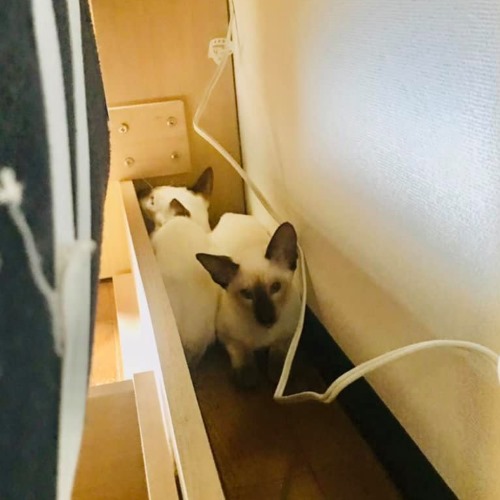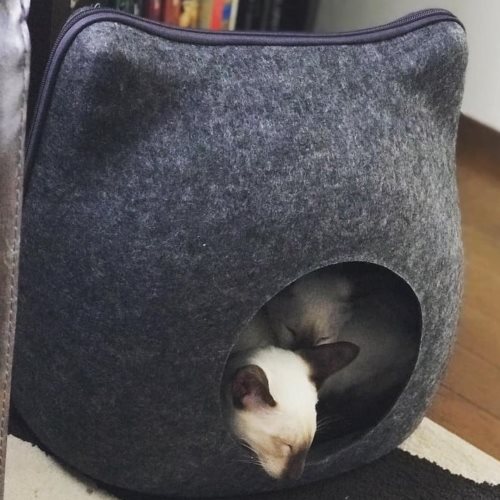- Home
- Meezer Musings
- August 2021
Meezer Musings: August 2021
Welcome Home! Settling In a New Cat or Kitten
Welcome to Meezer Musings! Here we are at the end of August - a month that seems to have gone by at lightning speed. (It has also been a cold and most unseasonal month here in the UK!)
This month, inspired by a question submitted to our Facebook page, we're talking about welcoming and settling in new additions to your cat family, whether they're young kittens or adult cats - illustrated, along the way, with one or two of the kitten photos we've received over the years.
Reader Rebecca came to our Facebook page to ask about her two recently-arrived kittens. Below you can see them not long after their arrival in their new home. And, as you can see, they've found a corner to hide in, apprehensive about their new world.
They came out and started to explore about twelve hours later.
 Photo with thanks to and copyright © Rebecca Dennison
Photo with thanks to and copyright © Rebecca DennisonIn her Facebook post, Rebecca asked:
"Any tips on how to speed up this initial coming-out-of-hiding part? I've got all their food and things in this room (they haven't tried eating yet that I can tell) and I've been coming in periodically to talk to them a bit and just be in the room. Is there anything else I should be doing?"
Rebecca's doing all the right things. The kittens have been placed in a quiet room with all the necessary items for their comfort - food, water, litter box, toys and bedding - and allowed to settle in.
When settling in any new kitten or cat, it's important to remember to see things from the cat's perspective. You, your household, and particularly any children in the house will be excited to welcome your new arrivals and acclimatize them quickly.
However, it's likely that the cat's whole world has just been turned upside down and everything familiar and reassuring has vanished. For kittens this could be their mother and littermates; to a rescue cat this would be their former way of life, whatever that might have been.
Everything is new and looks and feels completely alien, and unless you're very lucky and your kitten or cat is very brave and bold, it's going to take some time for them to get to know and trust you, and patience will be needed.
Coming in see them and talk to them from time to time is a great idea; so is bringing yourself down to their level and sitting on the floor with them so that they can come and explore you and get to know you, if they're brave enough to do so.
In a follow-up post, Rebecca went on to say that her kittens are four months old and playful but not very interested in being touched or snuggled.
There could be any number of reasons for this - it's hard to say why this might be without knowing more about their background. It might be that they weren't too well-socialized as young kittens - the primary window for socialization is from two to seven weeks old - or they may just have been taking some time to get used to their new environment.
Sometimes it can take months for kittens or traumatized cats to get to know and trust you well enough to allow themselves to be stroked and cuddled, as one of our early reader stories, here, shows. But patience and kindness (and treats!) usually wins them over in the end.
 Photo with thanks to and copyright © Rebecca Dennison
Photo with thanks to and copyright © Rebecca DennisonSettling In New Kittens
Above all, kittens need to feel safe in their new home. If possible, it's a good idea to designate one room to house your new kitten for their first week or so. Ideally this should be a warm room that gets little or no other traffic - perhaps a guest bedroom or a bathroom.
Before your kitten arrives, check what kind of food and litter they've been used to and try to provide the same brands to begin with. You can always change over to something else later on, but familiar food and familiar litter in their litter box will help them settle in quickly.
Gather together your essential supplies - food and water bowls; litter box, scoop and cat litter; a soft, cozy bed; a scratching post or scratch pad; and toys with bells, which you'll hear when the kitten starts to feel safe enough to play.
Kitten-proof the room by getting down to floor level and picking up anything that might be a hazard - small items like paper clips, screws and buttons, elastic bands, cords or string, and take away all plants, whether toxic or not, that a kitten might be tempted to chew.
Remove china or glass ornaments or other breakables that could be knocked over or pushed off accessible shelves. Kittens can climb!
Make sure that there are no holes in furniture or walls that the kitten might be able to crawl into - kittens have tiny bodies and the last thing you want is for them to escape or get stuck somewhere.
When your kitten arrives, take it straight to the safe room, open the carrier door, and wait. The kitten may or may not come out immediately but it's best to let them make the first move.
Check in on your kitten from time to time; talk quietly and play with it gently if it'll allow you to. The more quiet time you spend together, the quicker the kitten will come to know, trust and bond with you.
 Toodles
ToodlesPhoto with thanks to and copyright © Anelise Keyster (2014).
Introducing a New Cat to an Existing Cat Household
The notes above are useful whether or not you have other cats in the house. If you do have other cats, here are some further tips to follow to introduce a new kitten or an additional cat into an existing cat household.
Take your time with each step, making
each new step several days apart.
- Keep the new cat separate. Keep it confined to one room of the house with everything it needs (food, water, litter tray, toys, warm bed). It will feel safe, and your existing cat won't feel threatened.
- Exchange smells. Rubbing your new cat with your existing cat's blanket and vice versa, or getting them to sleep on each other's blankets, will help both cats get used to each other's smells while they're still separated.
- Swap territories. Once your new cat's more-or-less settled, confine your existing cat into one room (preferably not the room you've allocated as the 'safe house' for the new cat). Then allow the new cat out to explore the rest of the house, making sure all doors and windows are closed and keeping an eye on it so that it doesn't get accidentally lost! This will help distribute the new cat's smell around the house.
- Feed them together (but apart). Feed your new cat in its 'safe room' with the bowl near the door, but the door closed. Then feed your existing cat outside the closed door. They will be able to smell but not see each other.
- Introduce them.
Once you've completed everything above (preferably all the steps and in the
right order!) allow your cats to come together, but don't leave them
unsupervised until you're sure they don't fight.
- Invest in a calming pheromone spray.
To help things along, a calming spray or plug-in diffuser like Feliway MultiCat can be helpful.
Tail End ...
Let's finish with one of the first-ever rescued kitten stories submitted to this website. Beautifully written by April, a wildlife rescuer, it contains some useful information on providing quarantine for rescued animals and keeping them apart from other pets until they've been checked over and treated for any obvious infestations.
You can read April's story here.
That's all for August but I hope to be back at the end of September with another Meezer Musings. A warm welcome to any new kittens or cats in your own household and as the seasons change, wherever you are in the world stay safe and hug your Meezers tightly!
Caroline
Missed a Meezer Musings? A list of previous newsletters can be found here.
Some of the articles and newsletters on this site may contain links to products I think you may enjoy. If
you purchase through these links I receive a small commission, but there's
no extra cost to you. Find out more on the Affiliates Disclosure page.
Have You Discovered Our Newsletter?
If not, why not? Subscribe to our email newsletter, Meezer Musings, to stay in touch, be the first to see new information and pages as they come out, and read the things we only talk about in the newsletter.
Learn more about it on our Newsletter Sign-Up page.





